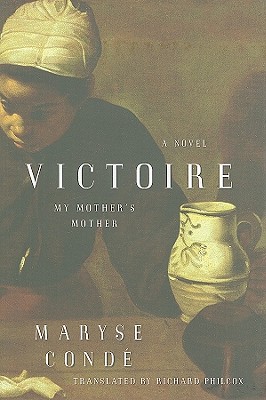Book Review: Victoire: My Mother’s Mother
by Maryse Conde
Publication Date: Jan 19, 2010
List Price: $19.99
Format: Hardcover, 208 pages
Classification: Nonfiction
ISBN13: 9781416592761
Imprint: Atria Books
Publisher: Simon & Schuster, Inc.
Parent Company: KKR & Co. Inc.
Read a Description of Victoire: My Mother’s Mother
Book Reviewed by Thumper
One of my favorite authors in the whole wide world is back with a new novel
that I loved, loved, loved! Maryse Condé's latest novel is Victoire: My
Mother’s Mother. I’m calling it a novel because it’s a cleaner
classification, but the book is much more than a novel. A case could be made
that it is a memoir, historical fiction or roman a clef, or history of a
family. The truth being Victoire is a combination of all of those components
and yet it is uniquely a whole other type of story. I cannot put my finger
on it, honestly, I don’t want to. I can say that this slim book is
marvelous, a small nugget of goodness that can light up a room, a heart, or
a person’s imagination. After reading the novel, it is easy to see Condé’s
fascination with her grandmother and to be under Victoire’s spell, as well.
Victoire Elodie Quidal is Condé’s maternal grandmother. Victoire died before
Condé was born, yet the author held a lifelong fascination with the
grandmother that she has only seen from a black and white photograph.
Condé’s desire to know more about her grandmother bore fruit with the
realization of Victoire. Condé begins the book around the late 1870s with a
brief family history leading to the birth of Victoire, how Condé’s great
grandmother Caldonia Jovial raised Victoire after her daughter, Eliette,
died giving birth to Victoire. Condé, in that beautifully honest and
compelling voice, lay forth Victoire’s childhood. In her early teens
Victoire went to work in the house of Fulgence Jovial, Caldonia’s cousin.
When Victoire becomes pregnant with Jeanne, Condé’s mother, she becomes the
cook of a wealthy Creole family. In her determination to insure that her
baby has a better life than the one she endured, Victoire, with no money,
leaves her home island of Marie-Galante and traveled to Guadeloupe to become
the cook for a rich family, the Walbergs. This incredible leap of faith and
sheer determination will change the lives of Victoire and her daughter in
ways that Victoire did not anticipate. Victoire is the imagined and real
life of an ordinary woman, who despite being an illegitimate, illiterate
servant raised and provided an education for her daughter, who eventually
became one of the most respected professionals in the country, all the while
possessing the soul of an artist.
I’m going to say upfront that this review is bound to evolve into an open
love letter to the author. I make no bones about it. Ain’t no shame in my
game; I LOVE Maryse Condé! She is one of my favorite authors of all time!
Condé have sent me through the most horrific, soul murdering human violence
and in the same fashion revealed the compassionate gentleness of lovers or
the beauty of the colors and smell of a rainforest. Condé is one of the
authors-Faulkner, Alice Walker,
Octavia Butler and
J. California Cooper to
name a few-who can bring subtlety to a train crashing into concrete
building. Condé calls forth her formidable skills and talents and gave me
Victoire.
Earlier in this review, I said that Victoire is not quite a novel, nor is it
a memoir, nor could it be called historical fiction. Victoire is not any of
those things, yet it is all of those things. Condé makes no apologies for
the ambiguousness of the book. There are times when the story gently shifts from
novel to memoir then back to novel then to historical fiction. The leading
indicator of when these changes happen is the narrator. For example, when
the book is at the place of Victoire living with the grown and married
Jeanne, quite effortlessly and smoothly, the narration duties will transfer
from the third person to Condé herself. Condé had blended the fictional
Victoire actions with that of her mother’s memories of Victoire. The story
of Victoire’s life is that of a quilt being sown together with Condé’s
imaginings and the memories of her daughter. Condé makes the mixing of these
different aspects and perspectives cohesive and seamless, a literary gumbo.
Ironically, when I began reading this book, I could not construct an image
of Victoire. I got no sense of her, just whiffs of the type of person or
character she was. Victoire was a lump of chalk. Condé provided a few
episodes of Victoire’s early life that let me know there is a pulse beating
inside this lump. There was an episode when Victoire was young she
disappeared only to be found asleep on her mother’s grave. A second episode
was when she began sneaking around the kitchen in order to learn how to cook
because the house cook did not want to teach her. Otherwise, Victoire was no
more than a glop of clay moving silently from one space to another. I
thought Condé wrote a sure fire DUD! My opinion of Victoire changed when I
realized that I made through the halfway point of the book and I was caught
up. When Victoire left her childhood home, I said, out loud, Damn, Condé got
me after all! As quiet and as soft as a breeze, Condé had developed that
lump of unfeeling, unmoving clay into a strong, stubborn, intelligent and
loving woman. I was blown away.
Victoire is the most fascinating book I probably will read this year. Condé
brought Victoire from being a childhood fascination to a remarkable
character in a small incredible story. Victoire, the woman and the book is
unforgettable.

